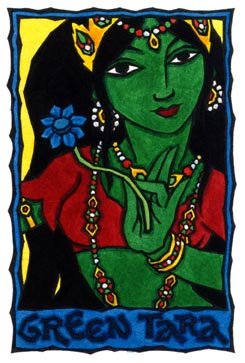One Mutha of a Film Festival, Day Four
The Festival continues with a day of films grouped under the title: "My Life Was Saved By Rock'n'Roll." Now, there are lots of films that have rock as a player or a subject or a backdrop, but in lots of these films -- the main character dies. And of course, what's more rock'n'roll than that? But I decided to take a twist here and list five films that feature rock in a way not so easily boarded on a doomed plane, over-dosed, offed by a gun...you get the picture.
High Fidelity
John Cusack is again my man in this wonderful adaptation of Nick Hornby's book by the same title. Breaking the familiar formula of rock films, Cusack does not play a musician but a record store owner (yes kids, records. Remember them?) named Rob who has elevated rock knowledge to a religion. His employees, played to high-art geek perfection by Jack Black and Todd Louiso, help Rob through the tedium of the shop and the torturous disintegration of his love life by playing a game in which one names their Top Five picks under increasingly obscure categories, including: Top five first cuts, Top five songs for Monday mornings, and Top five songs about death. Many favorite lines, but one in my top five would be: She's sort of post-Partridge-Family, pre-LA-Law Susan Dey-ish, only...you know...black.
Hard Days Night
The first rock film to capture some of the genuine engergy created by the music itself. One only has to suffer through any of Elvis' films to acknowledge that Hard Days Night is a pop culture milestone, a moment when it seemed as if the fans got a hold of the camera. John, Paul, George and Ringo are incredibly funny, fast, giddy, and just great to look at. And just when you really think you're having fun, they lay a song or two on you as well.
Monterey Pop
Called the first rock concert film, and I would argue it does a better job of getting the music across than the Woodstock "documentary." Mostly because the performers are in much better moods and apparently on much better drugs. Okay, okay -- you have to suffer through a completely comatose Momma's and Poppa's, a dazed Jefferson Airplane, and Country Joe and the Fish just being themselves. BUT! You also get Otis Redding showin us how it is done, The Who trying their hardest to look badass next to Hendrix, Hendrix giving us the kitchen sink including the humped Marshall stacks and a guitar on fire, AND Janice Joplin at the height of her powers delivering Ball and Chain in a manner that could actually help you see God.
Quadrophenia
Speaking of The Who...This story of Mod versus Rocker explores all sorts of themes concerning class, gender, fashion vs. belief, and generation gap miscommunication. It has a distinctive visual style and is true to the edgy and angry energy The Who could dish up like no one else. But in the end, Quadrophenia lets us follow Jimmy, our anti-hero, through his experience of heart-twisting adolescence -- and if rock does not capture that piece of internal conflict then it is simply not rock.
This Is Spinal Tap
You didn't think I was going to forget this, did you? One very funny element to the Spinal Tap legacy is that so many bands have claimed it's about them. What could be a higher complement and proof that the film captures so many rock cliches? It simply has no equal in the genre of faux-rockumentary or, as some call it, mockumentary. Alright, line up and tell me your favorite parts. Put me down for the explanation of how all the drummers died and the line "I mean we look like we've got armadillos in our trousers."

